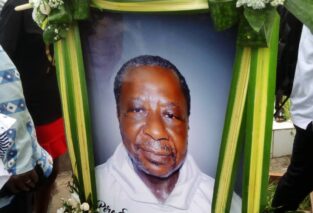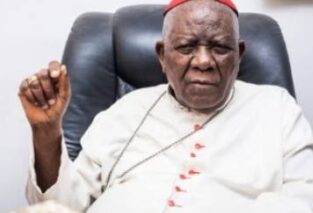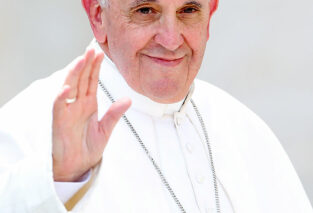The Diocese of Buea in Cameroon once stretched from the coastal town of Victoria to Nkambe, where the northern tip of English-speaking Cameroon snugly rubs its head against the belly of our neighbouring giant, Nigeria. Today, however, the Diocese of Buea looks like a shadow of its former self, having lost territory, first of all to what is today the Archdiocese of Bamenda, which, in turn, gave birth to the Diocese of Kumbo; then to the Diocese of Mamfe, and now the Diocese of Kumba-in-the-making. With such loss of territory, one would have expected the present occupant of the See of Buea, Monsignor Immanuel Bushu, to feel a tinge of sadness because his “power” seems to have been considerably eroded. Instead, he applauds the creation of other dioceses from the mother Diocese of Buea as the marvellous work of the Holy Spirit. Excerpts.
My Lord, you were recently transferred from the Diocese of Yagoua to Buea. As we await the appointment of your successor, who has temporary authority over your former diocese?
There is an Apostolic Administrator, Monsignor Bartholomew Yaouda, who is the present Vicar General of the Diocese of Maroua-Mokolo in the Far North Province of Cameroon.
Is he likely to succeed you?
Not necessarily. We strictly follow Canon law which stipulates that his job finishes as soon as there a new bishop is elected. He could, of course, be chosen to succeed me but, for now, he’s serving simply as an Apostolic Administrator.
We, the laity, and other men and women of good will, have been wondering why it is taking the Holy See so long to give us bishops to occupy vacant Sees in our country.
I don’t think it is really that long. Let’s take the case of Yagoua; when its first bishop died, it took almost 2 years to find a replacement. The problem is finding priests for the office. Church inquiries usually take long and are carried out in a detailed and thorough manner so as to avoid consecrating people who are not fit for this position. It does take time to find fitting candidates.
You’ve been in Buea for less than a year and already priests and laity alike are expressing worry that at the rate with which you’re working, touring parishes and carrying out other public activities, your health might soon take a beating. Why such intense activities, my Lord?
I won’t exactly say that I’m doing anything different from what I was doing in the North. I can even say that I had more activities in the North than I have here now. The North is a much vaster territory than Buea and I was out nearly all year round, except for the two months that I taught at the Major Seminary. Buea is a much smaller place and I thought it wise to first commune with my Christians before starting the proper long pastoral visits.
You have taken over a diocese that once extended to the borders with Nigeria to the north and to the west; however, it has now shrunk to less than a third of its previous size. Are you feeling a tinge of regret over the loss of your territory?
No, not at all! On the contrary, I’m happy because the creation of new dioceses is a wonderful sign that the Holy Spirit is at work in our land. The Church is growing from strength to strength and we are grateful to God Almighty for that! Once the Church sees that the Christian communities are growing stronger in their faith, she erects these circumscriptions as a way of bringing people closer to their Church and to their pastors. That’s how it should be.
Just as you were coming in, your predecessor was proposing to raise Kumba to a diocese, further reducing your territory. Could this be considered some sort of sabotage to further reduce your “power” and can you reverse that decision?
Why should I? I was given the authority to lead God’s people on their pilgrimage and such authority can be taken back at any time. In fact, the word “power” in the sense you’re using it has never entered my vocabulary at all. I think things are going as they should and if authority is being taken away so the Church may grow stronger in our land, all the better.
You’ve been in Buea for barely a year and already some of your immediate innovations are being applauded by your Christians. I’m thinking, for example, of the John Paul II Institute of Theology and the School of Music. Why do you think these institutions are necessary?
On the day of my installation, we were here in the Bishop’s conference room for a meal, and I was struck by the conversation around the table. Some of my guests were very well educated Christians, doctors, university professors, medical doctors, etc; but many of them openly admitted that when it came to matters of faith, they were honestly at the level of primary or secondary school children. To remedy this situation, some of them were going as far away as to Douala to attend the Archdiocesan Institute of Theology the Cardinal created there.
As I listened to them, I realised it was time to do something to address their concern. Why let people, who are yearning to enhance their faith, travel such long distances when we could do something about it at our level? That is why I there and then announced to them that they would no longer have to travel to Douala because we would be creating our own institute of biblical studies. The response was instantaneous and very enthusiastic. A few months after that, we started classes with up to 61 members for the first group of students. We thought of the music institute because people sing beautifully here, even without training, especially the young people. We thought it was important to start now.
We understand the response to the launching of the Institute of Theology, in particular, was very enthusiastic. Tell us something about it.
I’ve just written to the Christians to tell them that they were simply wonderful on the day of the launching of these endeavours. The Pontifical High Mass was very solemn; people were terribly generous when they gave. We collected on the spot more than CFA 4 million and the pledges were even more than that, and many of those who made the pledges have honoured them already. What an encouraging beginning, indeed!
Do you have the required staff for these institutions of learning?
Yes, for now, the staff is good. We have 11 staff members, only priests and the religious for the moment. They are from places like Limbe, Muyuka, Tiko, Buea, and they have been very good and regular, coming to class on time. For an institute of theology like ours, the Church insists that there be at least five people with doctorate degrees in various fields. We have been able to get that number and, with time, we shall train more people.
There has been much talk lately of a Catholic University for the Anglophone section of the country since the Catholic University in Yaoundé is more French than English. One would imagine that an institute like yours is likely to become a faculty of such a university when it does go operational.
That’s true. We’ve been thinking that if things were to go the way we envisage, we could raise it to a faculty. There’s indeed heated debate at the level of the Ecclesiastical Province of Bamenda on the possibility of a Provincial Catholic University for the English-speaking Cameroon. If this were to come to fruition, yes, we could raise our institute to the level of a faculty.
As the debate goes on, one imagines that the bishops of the various dioceses of the Ecclesiastical Province of Bamenda are now training, or thinking of sending for training, some of their priests to run such a University.
That’s correct. Dioceses have started sending out people for training already. Priests are already being sent to America, Germany, Rome, etc for training. Before they come back, things would certainly have been sorted out and they could start slowly and eventually build a big and strong Catholic university we all would be proud of.
You’re training priests and laity alike in your Institute of Theology. Aren’t you scared the laity could start to challenge and even baffle some of your priests in biblical matters after such training?
No, no. We do not look at it that way. It is the right of a baptised Catholic to be educated and well grounded in the faith. Priests study in the seminary to prepare themselves to serve this very people. A priest is therefore a servant who should prepare himself well to serve God’s people. If he starts to fear that lay people are going to be more educated in the faith than himself, then that becomes a very bad situation indeed. I remember when we were just beginning this project, one lady asked exactly the same question. What would happen if the lay people became so well educated in their faith that they begin to challenge priests? My response was simply that if such a challenge is not simply to humiliate the priest, then there’s nothing wrong with it. The priest is supposed to have received such training at the seminary as not to be afraid to face challenges concerning the faith from the lay faithful. This also implies that priests must now tighten their belts firmer and be up to speed at all the times with their faith so that they can respond appropriately to the needs of their Christians, the educated and the less educated alike. Priests should consider it a welcome challenge from lay people who have reached such a level of understanding in their faith as to hold reasonable theological or theoretical discussions that they themselves have acquired from the seminaries.
In one of your recent homilies on leadership in the Church, you cautioned your priests not to allow themselves to be caught off-guard because when a leader is caught, the troops disperse. What did you mean by that?
I was talking from the point of view of service. Service is a key word in Christian life. Christ spent his entire life serving others. He told his disciples: “I have come to serve and not to be served”. Those who are taking his place after his people should be like him. It is not only a Christian or Catholic concern. It is a human concern. We all need leadership and when we are properly led, we joyfully follow. If the leaders are not strong, the people they are supposed to lead start to go in dispersed ranks and when difficulties arise, they become confused and scatter like sheep without a shepherd. I was calling the priests’ attention to the fact that we, as priests, should always be aware that, because our life is very important for the community, anyone of us who goes astray, misleads many Christians. If, and whenever a priest goes astray, many people’s faith is shaken and many of them go astray as well. It is like the Old Testament story that says that once a leader was killed, the war was over and the rest of the army went back home.
Are you satisfied with the quality of leadership your priest are giving to your faithful?
I would say, yes, because the majority of our priests are doing their best. One or two may not be quite up to par with the rest. For example, some people might be tempted by money and they get too interested in what is in the till and forget their spiritual leadership role. Another may show a weakness for the bottle and take to it too keenly, thus neglecting his people in the process. We need the drink for our health, but when we take it a bit too much, it blurs our vision of good leadership and our esteem drops in the eyes of the people we should be leading. There are a few who may undermine the services the majority are rendering. However, even where only one falters, it is still as painful as when many fail. It is like the 99 Christ says we should leave behind and go out in search of the lost one. So when, and if, one priest goes astray, it is as painful as when many go astray. That is how I was looking, at the whole thing.
Can we say the recent suspension of one of your priests falls in line with what you’re saying?
Yes, it does. It is like Saint Paul telling the Church in Corinth to send away the young man who was living with his mother as his wife. That was the only language the young man could understand and sending him away was meant to give him some shock so he would come back to his senses before rejoining the community. It is in the same spirit that we took this action. We want to save the person and those the priest is supposed to lead because once he goes astray many follow him. The idea is to give him some form of shock that will set him thinking and eventually bring him back to the fold. There is nothing else behind our action.
Let’s briefly talk on evangelisation through the media; are you thinking of setting up a diocesan radio along the lines of Radio Veritas in Douala?
We admire what you people are doing at Radio Veritas and we’re hoping that we too will be able to set up our own diocesan radio. However, we’re handling too many things at once and it will be some months yet before we begin to see clearly. We need to carefully evaluate our priorities to see what is urgent and what is not. We cannot minimise or down play the importance of the mass media in communication today but it may be sometime yet before we get there. When we listen to your own services in Douala, it s a pleasure when we know that the Archdiocese has succeeded in using that means of mass communication which Catholics and non Catholics alike are benefiting from. As I say, all will depend on our priorities.


